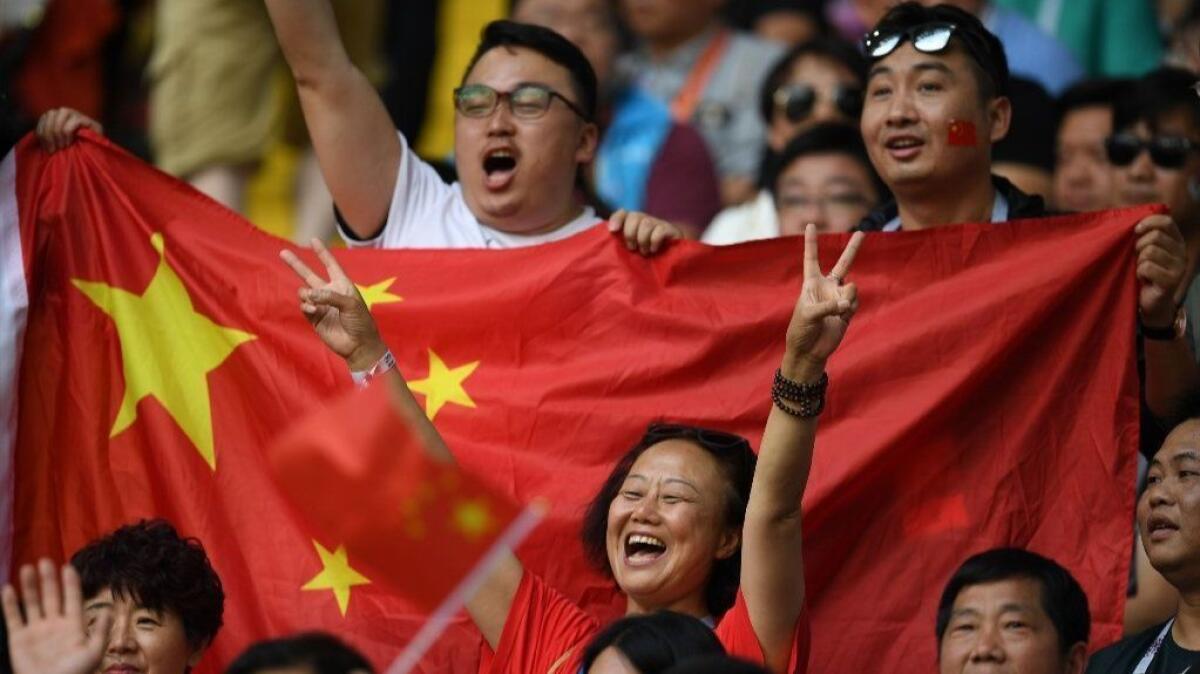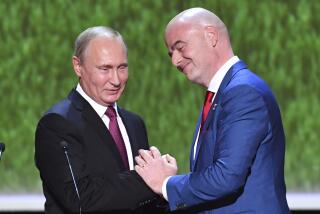No team? No problem for Chinese World Cup sponsors

China does not have a team in the World Cup — it finished fifth in its six-team group in Asian qualifying — but it does have a lot of fans in Russia, where the country’s economic clout has given it a huge presence.
Nearly 43,000 World Cup tickets were sold in China, more than were purchased in 26 countries that did send a team to Russia. Chinese fans purchased less than 11,000 tickets to the last two World Cups combined.
And corporate China is even more prominent at this summer’s tournament.
When several sponsors walked away from FIFA and the World Cup following the corruption scandal that rocked the organization three years ago, Chinese companies rushed to fill the void.
In front of Moscow’s Luzhniki Stadium, site of the opening and championship matches, Mengniu, China’s second-biggest dairy producer, has products lined up at a sprawling kiosk surround by plastic cows and a cutout of Argentine star Lionel Messi. The Wanda Group, the world’s largest private property developer, and electronics manufacturer Hisense also have stands at the stadium.
But you don’t have to go to Russia to notice China’s presence at the World Cup: Illuminated signs and field-side advertisements have brought Chinese names into homes around the world.
Two years ago, Wanda signed on as one of FIFA’s seven official partners, alongside Coca-Cola, Adidas, Gazprom, Qatar Airways, Visa and Hyundai/Kia. Hisense, Mengniu and Vivo, another Chinese electronics company, signed on as Russia 2018 sponsors within the last 15 months.
“They’ve realized that the world is their oyster,” Philippe Le Floc’h, FIFA’s chief commercial officer, told the Associated Press. “China is the biggest population in the world. It’s a massive economy. They have some very, very good companies who are eager to have a presence abroad, and I think it was just a nice fit.
“We are providing the best platform for them to push and show their competence and their products.”
But China may have bigger plans. President Xi Jinping has pushed development and investment in soccer amid widespread speculation the country will bid to host the event as early as 2030. China has played in the tournament just once, in 2002, when it lost its three group-stage games while getting outscored 9-0.
Russia fined over neo-Nazi banner
Russia’s soccer federation was fined $10,100 by FIFA after a fan displayed a neo-Nazi banner during the team’s 3-0 loss to Uruguay in Samara.
FIFA and monitoring experts working at World Cup matches said the banner included the number 88, which is recognized as far-right code for “Heil Hitler” because H is the eighth letter of the alphabet.
In a separate case, FIFA fined Serbia’s federation for a second time for fans displaying a Chetnik banner celebrating a World War II nationalist group. Serbia must pay $20,200 for a disciplinary charge of showing a “political and offensive banner” during the team’s 2-0 loss to Brazil in Moscow on Wednesday.
FIFA said it also warned the Russian and Serbian federations, and also Brazil’s federation for unspecified incidents involving its fans at the same game.
Meanwhile, Mexico’s federation was fined $15,150 over fans throwing objects during a 3-0 loss to Sweden.
One last look?
Coach Juan Carlos Osorio and some members of the Mexican team did some sightseeing in Moscow before leaving the capital for Samara, the site of Monday’s elimination-round game with Brazil.
Captain Andres Guardado, along with his wife and son, defenders Jesus Gallardo and Edson Alvarez, midfielder Javier Aquino and striker Raul Jimenez all joined Osorio in taking Friday afternoon off to spend several hours downtown visiting Red Square, among other places.
The Associated Press contributed to this story.
[email protected] | Twitter: @kbaxter11







